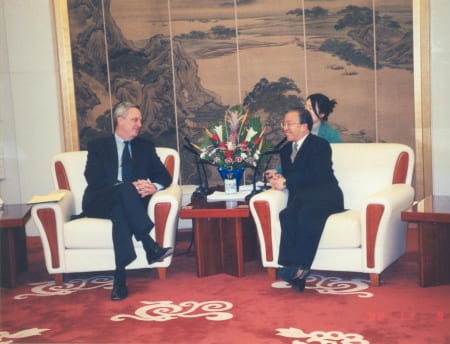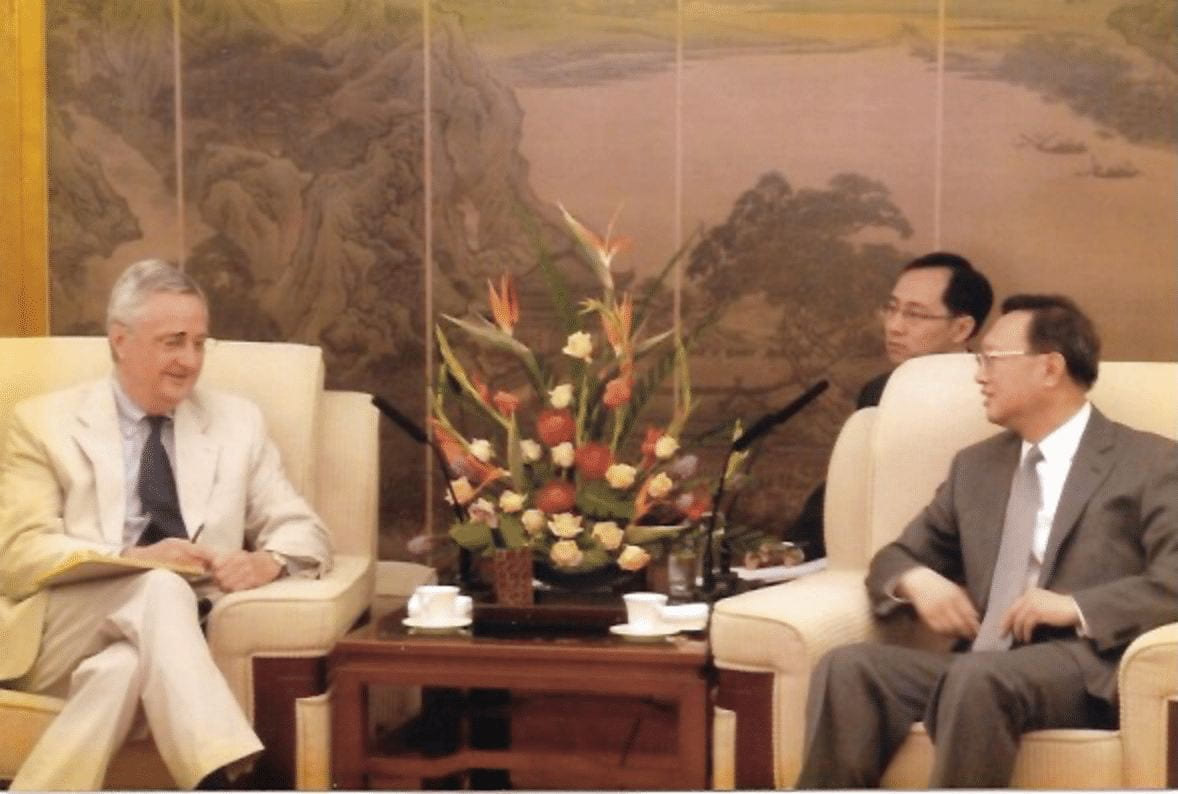China Policy Program

China Policy Program Director Professor David Shambaugh meets with State Councillor and Director of the Central Committee Foreign Affairs Office, Dai Bingguo, 2008.

China Policy Program Director and Professor David Shambaugh meets with then State Councillor and former Foreign Minister Yang Jiechi, July 2014.
Overview
The China Policy Program was established in 1998 as one of several constituent policy programs in the Elliott School of International Affairs and is affiliated with the Sigur Center for Asian Studies. The founding Director is David Shambaugh, Gaston Sigur Professor of Asian Studies, Political Science & International Affairs, who is a leading international authority on contemporary China and Asian affairs. The China Policy Program was created to build upon the Elliott School’s longstanding expertise and involvement in U.S.-China relations and contemporary Chinese affairs. It primarily serves as an outreach program to the policy community in Washington, officials, and China specialists around the world, the media, and the public.
Specifically, the China Policy Program is involved in the following types of activities:
- Sponsoring occasional public lectures and panel discussions open to the public and GW community.
- Sponsoring private scholarly and policy-related meetings of China specialists and government officials.
- Sponsoring the publication of scholarly books related to Chinese affairs.
- Sponsoring discussion meetings of Washington’s leading China experts drawn from academia, think tanks, the U.S. intelligence community, Congressional staff, and executive branch officials.
- Sponsoring Track 1.5 and Track 2 policy dialogues of a reasonably high-level, with participants from China, Europe, and Asia.
- Sponsoring media briefings, pegged to current and medium-term events in China and U.S.-China relations.
- Sponsoring tailored briefings for members of the corporate community related to China.
- Convening “study groups” to assist authors in revising book and article manuscripts.
- Receiving and briefing numerous visiting delegations from Asia, Europe, and the United States on issues related to China.
- Occasionally hosting in residence individual officials, scholars, and China specialists from around the world.
Over the past two decades, the China Policy Program has sponsored activities in all of these areas. The China Policy Program is not a teaching or research program, although Professor Shambaugh teaches multiple courses in the Elliott School. For further information please contact the Director, Professor David Shambaugh, at 202-994-5887 or shambaug@gwu.edu.
The China Policy Program has also partnered with the Asia Society’s Center on U.S.-China Relations on several projects and major reports.
One report draws upon discussions from the February 2020 symposium in Berlin, Germany with the Bertelsmann Stiftung. The symposium continued the China Policy Program’s long-time emphasis on convening experts of U.S.-China and European-China relations (for example, co-convening the American-European Dialogue on China from 2000-2018). This report highlights those discussions, “in the hope that it fosters deeper understanding of the shifting perspectives and policies concerning China on both sides of the Atlantic and will stimulate common purpose and further such transatlantic dialogues.” The report “Dealing with the Dragon: China as a Transatlantic Challenge” can be read at: https://asiasociety.org/sites/default/files/inline-files/Dealing%20with%20the%20Dragon_Report_25.06.20.pdf.
More recently, in August 2023, the report “Prioritizing Southeast Asia in American China Strategy” was published: https://asiasociety.org/sites/default/files/2023-08/Prioritizing%20Southeast%20Asia%20in%20American%20China%20Policy_0.pdf. The report draws upon a May 2023 conference that the China Policy Program co-sponsored with the Asia Society, University of California-San Diego’s 21st Century China Center, and the Institute of Southeast Asian Studies (ISEAS)-Yusof Ishak Institute in Singapore. The report outlines the relative positions of the United States and People’s Republic of China in Southeast Asia, and it provides numerous policy recommendations to the U.S. Government for advancing American influence in the region and more effectively competing with China.

